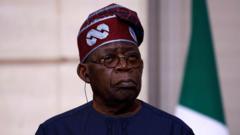In Nigerian politics, the balancing act of ethnic representation has long been a cornerstone of governance, aimed at preserving national unity in a country rich in diversity. However, there are rising concerns that this informal understanding is being disregarded under President Bola Tinubu's administration, with critics pointing to a one-sided appointment strategy favoring the Yoruba ethnic group.
Although Nigeria's constitution mandates regional representation in cabinet roles, the unwritten convention has facilitated an equitable distribution of vital positions, a practice aimed at fostering a sense of national cohesion in a nation harboring over 250 ethnic groups. The growing unease around President Tinubu's appointments suggests that many believe the delicate balance established over years is at risk.
Tinubu’s selection of a fellow Muslim from his Yoruba community as his running mate broke from a historic precedent of mixed Muslim-Christian slates, with Nigerians traditionally favoring this approach to ensure a compromise reflective of the nation's religious divide. As of April 2023, all eight significant positions in his administration, crucial to the economic and security infrastructure, were held by Yoruba individuals, sparking debate about ethnic favoritism within the leadership.
This unprecedented concentration of power in one ethnic group raises fears of deepening divides, which have historically led to strife within Nigeria. Political analysts assert that while past presidents maintained a more balanced ethnic representation, Tinubu's cabinet composition appears unmatched in its lack of diversity, prompting concerns about fairness.
The criticism intensified with the recent appointment of Bayo Ojulari as the head of the Nigerian National Petroleum Company (NNPC), a position previously occupied by a northerner. Observers note that under former presidents Goodluck Jonathan and Muhammadu Buhari, such concentrations of ethnicity in essential roles were not prevalent.
Academics and analysts suggest that it’s crucial for Nigeria’s democratic health that appointments reflect the nation’s diversity, warning that continued trends could undermine national unity and the future of democracy. Observers from northern states expressed alarm over their perceived marginalization, particularly after tumultuous transitions marked by the removal of key figures such as Abdulrasheed Bawa from the Economic and Financial Crimes Commission (EFCC).
Despite the backlash, Tinubu's office defends the appointments as representative of merit across regions. However, internal dissent from politicians within Tinubu's own party signals discord about the inclusiveness of his leadership strategy. Critics assert that appointments need to be reflective of Nigeria's multi-ethnic fabric to alleviate the tensions brewing from perceived inequity.
While some voices call for an end to ethnic considerations in governance, many experts assert that a legacy of equitable representation must be maintained to preserve stability and ensure all regions feel included in the national discourse. Political commentators express hope that future leadership will prioritize inclusion and remedy current ethnic imbalances to restore trust among Nigeria’s diverse population.




















